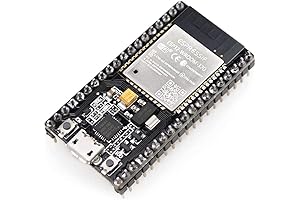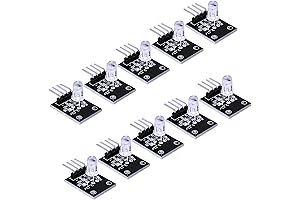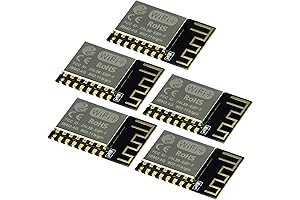· single board computers · 13 min read
Best Arduino WiFi Modules in 2024: Enhancing Your Projects with Wireless Connectivity
Discover the top performers among Arduino WiFi modules, meticulously curated to elevate your projects with seamless wireless integration.
In the realm of DIY electronics, Arduino boards reign supreme, offering a gateway to endless possibilities. To further enhance the capabilities of your Arduino projects, consider integrating a WiFi module, unlocking a world of wireless connectivity. Our comprehensive guide unveils the best Arduino WiFi modules available in 2024, empowering you to make informed choices and elevate your projects to new heights.
Overview

PROS
- Effortless integration with Arduino IDE for streamlined development
- Dual-mode WiFi (2.4GHz) and Bluetooth connectivity for versatile wireless applications
- Exceptional performance with dual-core microcontroller processor
- Integrated antenna, RF amplifier, and filter ensure reliable signal reception and transmission
- Compact design with built-in headers for convenient prototyping and breadboarding
CONS
- Requires additional components (e.g., power supply, programming interface) for complete functionality
- May require advanced technical skills for complex projects
Immerse yourself in the world of wireless connectivity with the HiLetgo ESP-WROOM-32 Arduino WiFi Module Development Board. This exceptional module seamlessly integrates with the Arduino IDE, empowering you to create and deploy cutting-edge IoT projects with ease. Its dual-mode WiFi and Bluetooth capabilities open up a myriad of possibilities, enabling you to connect to a wide range of devices and networks.
At the heart of the ESP-WROOM-32 lies a powerful dual-core microcontroller processor, delivering exceptional performance and efficiency. The integrated antenna, RF amplifier, and filter work in harmony to ensure stable and robust signal reception and transmission. The compact design and built-in headers make this module ideal for prototyping and breadboarding, allowing you to quickly bring your ideas to life. Whether you're a seasoned developer or just starting your IoT journey, the HiLetgo ESP-WROOM-32 Arduino WiFi Module is an indispensable tool that will elevate your projects to new heights of connectivity and innovation.
![Arduino MKR WiFi 1010 [ABX00023]: Your IoT Gateway to Wireless Connectivity](https://m.media-amazon.com/images/I/61eFBzWHYrL.AC_SR460,460.jpg)
PROS
- Effortless IoT integration with built-in WiFi and Bluetooth connectivity
- Arduino IDE compatibility simplifies development for beginners and experts alike
CONS
- Limited GPIO pins may restrict project expansion
- Requires external power source for standalone operation
Step into the realm of wireless possibilities with the Arduino MKR WiFi 1010, your gateway to seamless IoT connectivity. This compact module empowers you to bridge the gap between your projects and the digital world with its integrated WiFi and Bluetooth capabilities. Dive into the intuitive Arduino IDE, where coding becomes a breeze, whether you're a seasoned pro or just starting your IoT journey.
As you embark on your IoT adventures, embrace the MKR WiFi 1010's user-friendly design. Its streamlined form factor seamlessly integrates into your projects, making it an ideal choice for prototyping and production. However, keep in mind that its limited GPIO pins may impose constraints on your project's scalability. Additionally, standalone operation requires an external power source, adding an extra element to your project's design.

PROS
- Introduces concepts of Internet of Things (IoT) and WiFi connectivity
- Includes a comprehensive guide with clear instructions and code examples
- Offers a hands-on approach to learning through interactive projects and challenges
CONS
- Requires some prior knowledge of Arduino programming
- Components may require soldering, which could be challenging for beginners
The OSOYOO WiFi Internet of Things Learning Kit is an excellent resource for individuals interested in learning about IoT and WiFi connectivity using Arduino. This kit includes an ESP8266 WiFi shield and a comprehensive guide that covers the fundamentals of IoT, WiFi communication, and Arduino programming. Through hands-on projects and challenges, users can gain practical experience in building and programming IoT devices.
The kit's guide provides step-by-step instructions and clear explanations, making it suitable for both beginners and experienced makers. However, it's worth noting that some prior knowledge of Arduino programming is recommended to fully grasp the concepts presented in this kit. Additionally, some components may require soldering, which could pose a challenge for users without prior experience.

PROS
- Integrates ESP8266 WiFi module for seamless wireless connectivity.
- Arduino compatibility simplifies programming and project development.
CONS
- Requires basic electronics knowledge for setup.
- Wireless range may be limited in certain environments.
The ESP8266 ESP-01S NodeMCU Development Board is an exceptional tool for hobbyists and professionals alike. Combining the popular ESP8266 WiFi module and the user-friendly Arduino platform, this board empowers you to create innovative projects with ease. Its wireless connectivity allows for remote control and data transfer, making it ideal for IoT applications. The Arduino compatibility ensures a simplified programming experience, enabling you to quickly bring your ideas to life.
However, it's important to note that some basic electronics knowledge is necessary for setting up and using this board effectively. Additionally, while the WiFi connectivity is a major advantage, the range may be limited in certain environments, so consider your project's specific needs before choosing this board.

PROS
- Pack of two U R3 D1 R32 development boards for extended connectivity
- Wi-Fi and Bluetooth capabilities expand project possibilities
- 4MB flash memory provides ample storage for your code
- ESP32 microcontroller offers high performance and efficiency for demanding applications
- Included USB cable simplifies setup and programming
CONS
- Requires technical knowledge for configuration and programming
- May not be suitable for beginners or users unfamiliar with electronics
The U R3 D1 R32 development board is an ideal choice for hobbyists and professionals seeking to incorporate wireless functionality into their Arduino projects. With its built-in Wi-Fi and Bluetooth modules, this board empowers you to establish secure connections and exchange data wirelessly. The included 4MB flash memory provides ample space for storing your code, ensuring smooth operation and reliable performance.
The ESP32 microcontroller at the heart of this development board offers exceptional processing power and energy efficiency, making it suitable for demanding applications. Whether you're building home automation systems, IoT devices, or robotics projects, this board delivers the capabilities you need. The included USB cable simplifies the setup process, allowing you to quickly connect the board to your computer for programming and debugging.

PROS
- Effortless integration with Arduino platforms for seamless connectivity
- Reliable real-time clock (RTC) module ensures precise timekeeping
CONS
- Requires external battery for RTC operation
- May encounter compatibility issues with certain Arduino boards
Embark on a world of wireless possibilities with the HiLetgo 5pcs DS3231 AT24C32 Clock Module. Seamlessly connect your Arduino projects to the digital realm and empower them with real-time accuracy. This exceptional module boasts an IIC interface, granting you effortless integration into your Arduino ecosystem. Its reliable RTC module ensures your projects maintain impeccable timekeeping, even in the absence of a power source (external battery required).
While this module shines in its functionality, it's not without its quirks. Compatibility may pose a challenge with specific Arduino boards, and the lack of an inbuilt battery for RTC operation might require additional considerations. Nevertheless, the HiLetgo 5pcs DS3231 AT24C32 Clock Module remains an invaluable asset for Arduino enthusiasts and project builders alike, promising enhanced connectivity and precise timekeeping for your innovative creations.
![Arduino Uno REV3 [A000066] Wi-Fi Enabled](https://m.media-amazon.com/images/I/71z22cRPeeL.AC_SR460,460.jpg)
PROS
- Add Wi-Fi capabilities to your Arduino projects
- Simple to use with the Arduino IDE
- Works with a wide range of Arduino boards
- Low cost and open source
CONS
- Requires some soldering to attach to your Arduino board
- Can only be used with 2.4GHz Wi-Fi networks
The Arduino Uno REV3 [A000066] Wi-Fi module is a low-cost and easy-to-use way to add Wi-Fi capabilities to your Arduino projects. It's compatible with a wide range of Arduino boards, and it can be programmed using the Arduino IDE. The module is also open source, so you can customize it to meet your specific needs.
To use the module, you'll need to solder it to your Arduino board. Once it's attached, you can use the Arduino IDE to program it. The IDE includes a number of examples that you can use to get started. Once you've programmed the module, you'll be able to connect your Arduino project to a Wi-Fi network and control it remotely.

PROS
- Supports multiple network protocols, including Wi-Fi, Bluetooth, and BLE
- Onboard atmospheric pressure, temperature, humidity, and light sensors
- Compact design with an easy-to-use interface
- Extensive documentation and resources are available online
CONS
- Could use more detailed instructions on setup
- Display might be too small for some users' needs
This weather station and instrument kit is an ideal starting point for learning about weather monitoring and data logging. It includes everything you need to get started, including an ESP32 WiFi module, a 0.96-inch OLED display, a DHT-11 temperature and humidity sensor, a BMP-180 atmospheric pressure sensor, and a BH1750 light sensor. The kit also comes with a micro USB cable and a breadboard, so you can easily connect all of the components.
The ESP32 WiFi module is the brains of the weather station. It's a powerful microcontroller that can connect to Wi-Fi networks and send data to the cloud. The OLED display is used to show the current weather conditions, such as the temperature, humidity, atmospheric pressure, and light intensity. The DHT-11 temperature and humidity sensor measures the temperature and humidity of the air. The BMP-180 atmospheric pressure sensor measures the atmospheric pressure. And the BH1750 light sensor measures the light intensity. This weather station is able to determine the altitude of your location through the BMP180 sensor.

PROS
- Versatile compatibility with Arduino, ESP32, ESP8266, and Raspberry Pi platforms
- Convenient pack of 10 modules for ample project supply
- Effortless control of RGB LEDs for dynamic lighting effects
CONS
- Documentation may be limited for specific platforms
- Requires basic electronics knowledge for setup and integration
Transform your projects into a vibrant symphony of colors with this RGB LED Module, seamlessly compatible with popular platforms like Arduino, ESP32, ESP8266, and Raspberry Pi. Its user-friendly design allows for effortless control of RGB LEDs, empowering you to create mesmerizing lighting effects that elevate your projects to new heights.
With a generous pack of 10 modules, you'll have ample supply for all your lighting endeavors. Whether you're a seasoned electronics enthusiast or just starting your journey, this module makes it easy to add a touch of color and dynamism to your creations. Embrace the power of RGB LEDs and let your projects shine brighter than ever before!

PROS
- Exceptional value for money with a pack of five ESP8266 ESP-12F microcontrollers.
- Versatile compatibility with Arduino, NodeMCU, and MicroPython platforms, empowering a wide range of projects.
- Seamless 802.11N WiFi connectivity enables effortless IoT applications and wireless communication.
- Compact and efficient design ensures easy integration into various project setups.
- Backed by JacobsParts' commitment to quality, providing peace of mind for reliable performance.
CONS
- Some users may require additional external components for specific project requirements.
- Documentation and support resources may vary depending on the chosen platform.
JacobsParts ESP8266 ESP-12F WiFi Microcontroller 5-Pack is an exceptional choice for hobbyists, makers, and developers seeking a cost-effective and versatile solution for their IoT endeavors. This pack of five microcontrollers offers exceptional value for money, allowing you to embark on multiple projects simultaneously.
The ESP8266 ESP-12F microcontrollers boast compatibility with Arduino, NodeMCU, and MicroPython platforms, empowering you with a wide range of options for project development. Whether you're a seasoned Arduino enthusiast or exploring the possibilities of MicroPython, these microcontrollers seamlessly adapt to your preferred environment. The integrated 802.11N WiFi connectivity ensures effortless integration into IoT applications, enabling wireless communication and remote control capabilities.
Embark on a journey through the latest advancements in Arduino WiFi modules, where connectivity meets innovation. Our discerning analysis presents a meticulously curated selection of top-rated modules, empowering you to seamlessly integrate wireless capabilities into your Arduino projects. Whether you aspire to create home automation systems, remote-controlled devices, or IoT solutions, these modules provide a robust and reliable foundation for your endeavors. Prepare to unlock the full potential of your Arduino projects with our comprehensive guide to the best WiFi modules of 2024.
Frequently Asked Questions
What are the key features to consider when selecting an Arduino WiFi module?
When choosing an Arduino WiFi module, several key factors warrant consideration. These include the module's compatibility with your Arduino board, its range and signal strength, its power consumption, and any additional features such as encryption or support for multiple protocols.
How do I integrate an Arduino WiFi module into my project?
Integrating an Arduino WiFi module into your project typically involves connecting it to your Arduino board via its designated pins. You will need to establish communication between the module and your Arduino using the appropriate software library. Refer to the module's documentation for specific instructions on wiring and programming.
What are some practical applications of Arduino WiFi modules?
Arduino WiFi modules open up a vast array of possibilities for your projects. You can use them to create wireless sensors that transmit data over the internet, control devices remotely via a smartphone app, or build IoT applications that connect to cloud services.
How do I ensure the security of my Arduino WiFi module?
Securing your Arduino WiFi module is crucial to prevent unauthorized access and data breaches. Employ encryption mechanisms such as WPA2 or WPA3 to protect your wireless communication. Additionally, keep the module's firmware up to date to address any vulnerabilities.
What are some of the best Arduino WiFi modules available in the market today?
Our comprehensive guide showcases the top-performing Arduino WiFi modules available in 2024. Among the highly recommended options are the HiLetgo ESP-WROOM-32, Arduino MKR WiFi 1010, and ESP8266 ESP-01S NodeMCU Development Board.

![Arduino MKR WiFi 1010 [ABX00023]: Your IoT Gateway to Wireless Connectivity](https://m.media-amazon.com/images/I/61eFBzWHYrL.AC_SR300,200.jpg)




![Arduino Uno REV3 [A000066] Wi-Fi Enabled](https://m.media-amazon.com/images/I/71z22cRPeeL.AC_SR300,200.jpg)






